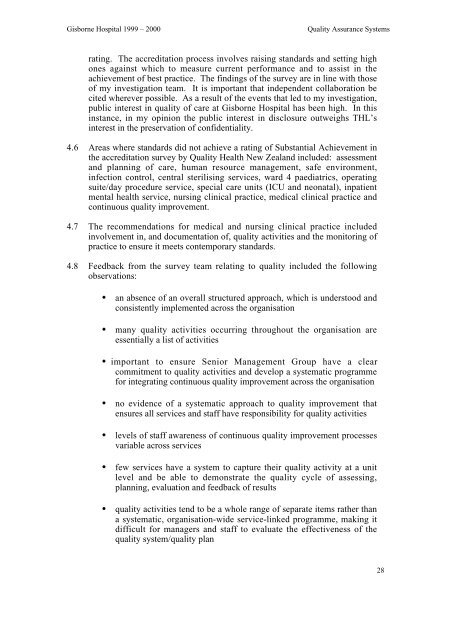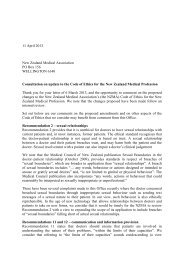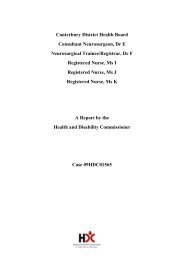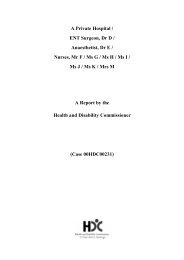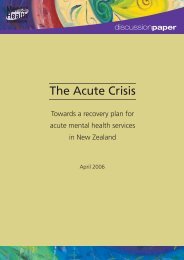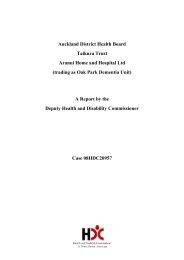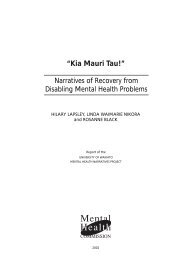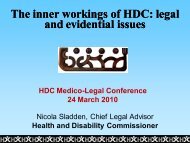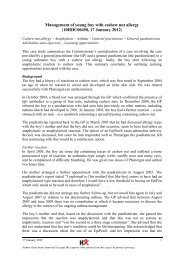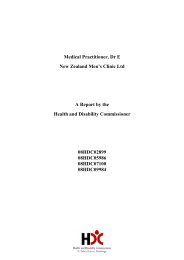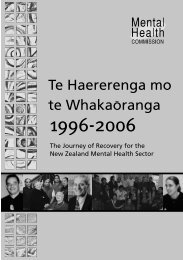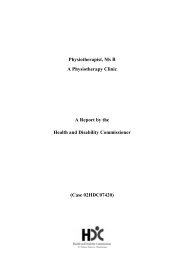Gisborne Hospital Report - Health and Disability Commissioner
Gisborne Hospital Report - Health and Disability Commissioner
Gisborne Hospital Report - Health and Disability Commissioner
You also want an ePaper? Increase the reach of your titles
YUMPU automatically turns print PDFs into web optimized ePapers that Google loves.
<strong>Gisborne</strong> <strong>Hospital</strong> 1999 – 2000<br />
Quality Assurance Systems<br />
rating. The accreditation process involves raising st<strong>and</strong>ards <strong>and</strong> setting high<br />
ones against which to measure current performance <strong>and</strong> to assist in the<br />
achievement of best practice. The findings of the survey are in line with those<br />
of my investigation team. It is important that independent collaboration be<br />
cited wherever possible. As a result of the events that led to my investigation,<br />
public interest in quality of care at <strong>Gisborne</strong> <strong>Hospital</strong> has been high. In this<br />
instance, in my opinion the public interest in disclosure outweighs THL’s<br />
interest in the preservation of confidentiality.<br />
4.6 Areas where st<strong>and</strong>ards did not achieve a rating of Substantial Achievement in<br />
the accreditation survey by Quality <strong>Health</strong> New Zeal<strong>and</strong> included: assessment<br />
<strong>and</strong> planning of care, human resource management, safe environment,<br />
infection control, central sterilising services, ward 4 paediatrics, operating<br />
suite/day procedure service, special care units (ICU <strong>and</strong> neonatal), inpatient<br />
mental health service, nursing clinical practice, medical clinical practice <strong>and</strong><br />
continuous quality improvement.<br />
4.7 The recommendations for medical <strong>and</strong> nursing clinical practice included<br />
involvement in, <strong>and</strong> documentation of, quality activities <strong>and</strong> the monitoring of<br />
practice to ensure it meets contemporary st<strong>and</strong>ards.<br />
4.8 Feedback from the survey team relating to quality included the following<br />
observations:<br />
• an absence of an overall structured approach, which is understood <strong>and</strong><br />
consistently implemented across the organisation<br />
• many quality activities occurring throughout the organisation are<br />
essentially a list of activities<br />
• important to ensure Senior Management Group have a clear<br />
commitment to quality activities <strong>and</strong> develop a systematic programme<br />
for integrating continuous quality improvement across the organisation<br />
• no evidence of a systematic approach to quality improvement that<br />
ensures all services <strong>and</strong> staff have responsibility for quality activities<br />
• levels of staff awareness of continuous quality improvement processes<br />
variable across services<br />
• few services have a system to capture their quality activity at a unit<br />
level <strong>and</strong> be able to demonstrate the quality cycle of assessing,<br />
planning, evaluation <strong>and</strong> feedback of results<br />
• quality activities tend to be a whole range of separate items rather than<br />
a systematic, organisation-wide service-linked programme, making it<br />
difficult for managers <strong>and</strong> staff to evaluate the effectiveness of the<br />
quality system/quality plan<br />
28


